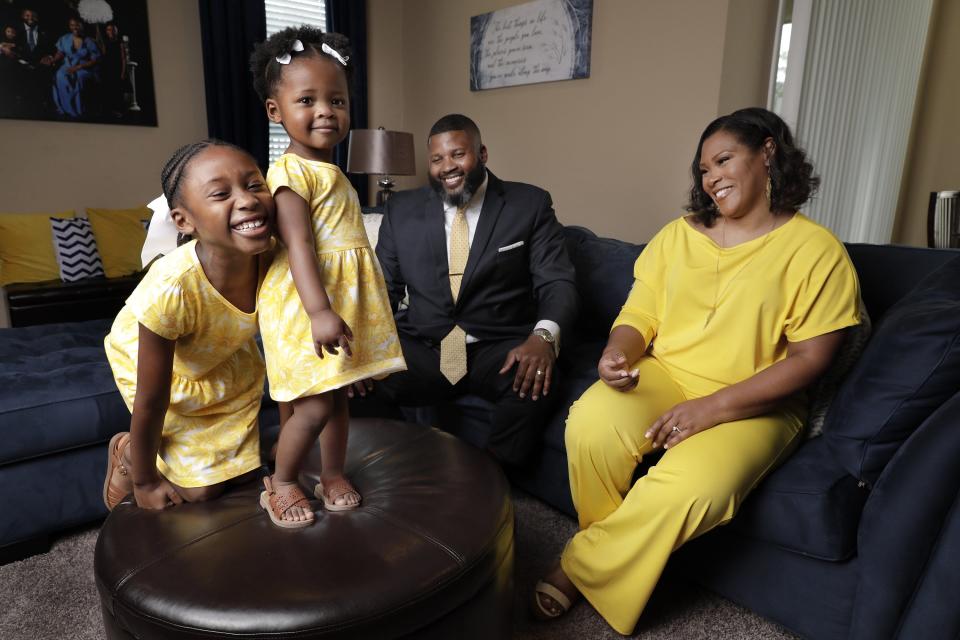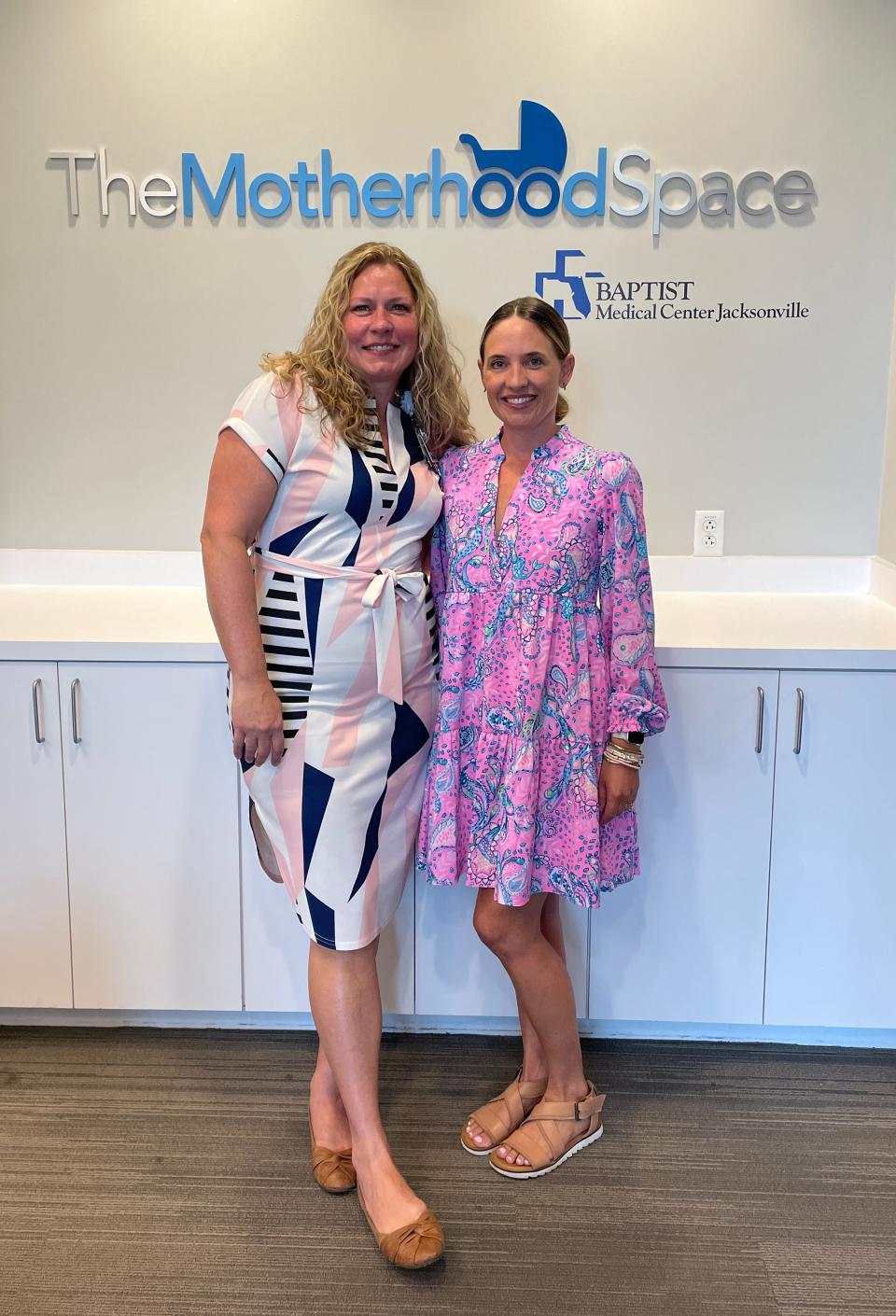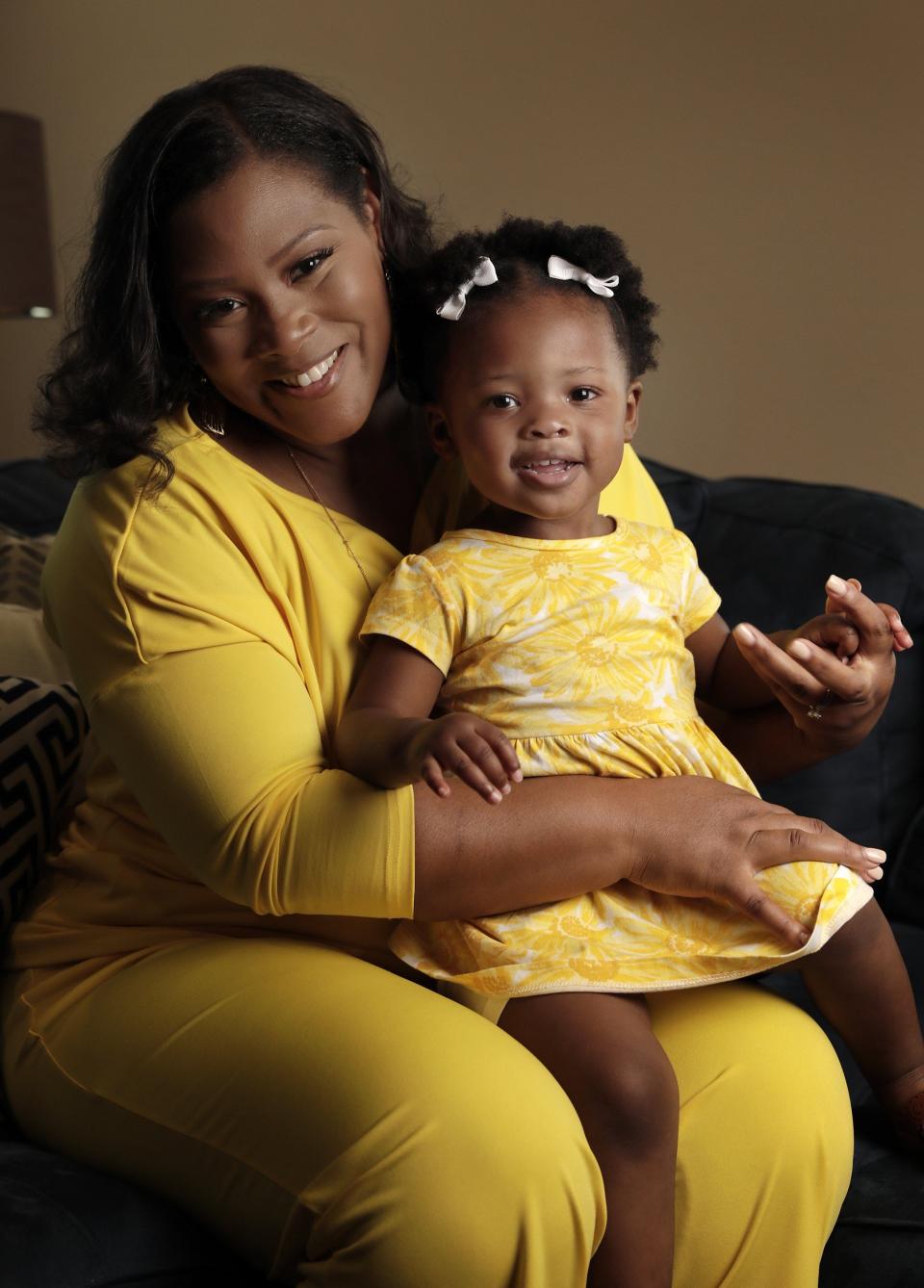The baby blues: Safe haven opens for Jacksonville women with postpartum mood disorders
Diagnosed with bipolar disorder at age 21, Alexandria Smith fully expected postpartum depression to descend on her after the birth of her first daughter seven years ago.
But Smith, of Jacksonville and now 43, was not prepared for what actually happened.
What descended was postpartum psychosis, one of the most severe mental illnesses associated with childbirth. It began with anxiety and not sleeping, she said, then "ratcheted up" to hallucinations and a "complete" break from reality. She thought her husband was trying to kill her and take her baby away. She was ultimately involuntarily hospitalized for mental health treatment.
"It hit me like a train," she said. "So scary and unexpected."
With medications and therapy, she recovered. Smith also had postpartum psychosis after the birth of her second child two years ago but said she had a "completely different experience" then because she was prepared and had a support system and medical team ready.
Leading her team was Jill Garrett, her psychologist since 2019. Garrett recently launched The Motherhood Space, Baptist Health's new outpatient day program for pregnant women and new mothers suffering from perinatal mood and anxiety disorders, often referred to as postpartum depression.

Smith is too far beyond her second child's birth to qualify — new moms must be within 18 months of delivery ― but urges women who need the services to check them out.
"This is just a dream," Smith said. "I would have loved to have had something like this, to be able to stay at home."
Motherhood Space incorporates therapy, medication and wellness
The Motherhood Space concept arose with program director Garrett, who said she found few "emotional support" resources for new mothers after her own daughter was born eight years ago. Since her practice at the time was at Baptist Health, she consulted with leaders there to "see what we can do," she said.
First she founded a maternal mental health service line at Baptist Medical Center. This year came the day program, as well as psychoeducation for health providers who interact with women in the perinatal period and an online video series on maternal mental health.
Maternal mental health conditions are common complications of pregnancy, childbirth and postpartum — affecting 1 in 5 women, according to the American Hospital Association. About 1 in 8 women experience symptoms of postpartum depression, according to the Centers for Disease Control and Prevention, with the rate of depression diagnoses at delivery increasing and seven times higher in 2015 than in 2000.
Postpartum psychosis is rare, affecting 1 to 2 mothers out of every 1,000 deliveries, according to Postpartum Support International, a Seattle-based advocacy group. The onset is usually sudden, most often within the first two weeks postpartum, but can appear any time in the first year, according to the group.
"We are here to help. Moms, you are not alone," Garrett said. "We recognized the need for intensive and comprehensive support for expectant and new moms, and we’re honored to … make this much-needed support more easily accessible."

Garrett uses the umbrella term "perinatal mood and anxiety disorders," which includes postpartum depression and psychosis that can occur in pregnancy or within a year or so after birth.
Most new moms experience postpartum "baby blues" after childbirth, including mood swings, crying spells, anxiety and difficulty sleeping, according to the Mayo Clinic. Those symptoms usually begin within the first two to three days after delivery and may last for up to two weeks.
"There are a lot of different emotional challenges, but mom is not necessarily dealing with depression," Garrett said. "A good rule of thumb is how much is it impacting day to day, how long it has been bothering you … if you're so overwhelmed you can't sleep, eat, work or go to school or interact with your partner."
When severe, long-lasting symptoms are present, a new mom or loved one should seek help, she said.
At The Motherhood Place, new mothers receive individual and group therapy led by a team of psychologists who specialize in perinatal mental health. Located at the Winston Family YMCA in Jacksonville, the program has an emphasis on wellness, including walking therapy, yoga and health coaching. The Motherhood Space is the only day program of its kind in the country that has wellness component, Garrett said.
The program also provides evaluation for medication and referral for aftercare support services. On site there is a private lactation area for breastfeeding mothers and free childcare through the YMCA KidZone.
The day program can accommodate about 12 women at a time; they do not have to be Baptist Heath patients and insurance typically covers the cost, Garrett said.
No more babies: No more babies: Maternity care ends in March at Ascension St. Vincent's Riverside
"Every detail has been carefully crafted around what mothers experiencing mental health conditions need most," said Terrie Andrews, vice president of Baptist Behavioral Health. "From the thoughtful programming to the convenient location, we know The Motherhood Space will be a place of healing for so many women in our community."
The program is for women who are experiencing moderate to severe symptoms, Garrett said. The most severe cases, such as Smith's first episode of postpartum psychosis, would be referred to a hospital, Garrett said.
"If a person is actively psychotic, that would constitute a psychiatric emergency and we would want this mom to have immediate support through an emergency department evaluation," she said. "Once stable and safe, The Motherhood Space Day Program is available for ongoing support."
Support system key to intervention, recovery
Garrett said Smith was right to be prepared for possible mental health complications during or after pregnancy because of her bipolar disorder. A personal or family history of mental health challenges is a risk factor, Garrett said.
Smith had decided not to breastfeed so she could stay on her bipolar disorder medications. But as for potential psychosis, "I had no idea what that even was," she said.
It started early on.
"Right after [her eldest daughter's] birth, I was being really anxious, not sleeping," she said. "The more I lose sleep the more anxious I got."
And when it became severe, she "wouldn't admit" that she needed help, she said. That led to her being involuntarily hospitalized under the Baker Act, a Florida law that allows a person to be temporarily detained for emergency health services.
Smith was taken to the Mental Health Resource Center in Jacksonville, which at the time was the closest mental hospital to her home. At some point later she began having seizures and was transferred to UF Health Jacksonville's maternal care unit for treatment of eclampsia, which is seizures during pregnancy.
"I have no recollection of any of these details. Between the psychosis and the eclampsia, it truly felt like an outer-body experience," Smith said.
Typically, psychiatric hospitalizations include "acute stabilization through assessment and diagnosis" and in many cases medication developed for mental health conditions, Garrett said. Few inpatient psychiatric hospitals in the U.S. specialize in the perinatal period, she said.
Time to talk about it: Talkable Communities offers courses to spot youth mental health crises
"There was no indication … that the eclampsia was in any way related to the cause of the psychosis," Smith said. After receiving intravenous medication at UF Health, "I snapped back to myself," she said.
Her experience with bipolar disorder and postpartum psychosis has transformed her into an advocate, particularly for mothers-to-be and new mothers. She has founded a health and wellness website — Mom • Wife • Worship Life, at momwifeworshiplife.com — to share what she has learned about balancing motherhood, marriage, faith and having a chronic mental illness.
"Mothers and wives struggle to find balance," she said. "They need to build a community around them."
They should seek professional help if they feel "off," she said. And they should "rely on your tribe," a support system that is capable, if necessary, of intervening, she said. "They can recognize symptoms," Smith said.

Her husband of eight years, Stephen Smith, a pastor and attorney, leads her tribe. "He has been the most amazing help that I have," she said.
Also there are plenty of resources online and, in Jacksonville, The Motherhood Place.
"I feel amazing," Smith said. "I know where I've come from. I'm able to thrive, not just survive."
bcravey@jacksonville.com, (904) 359-4109
THE MOTHERHOOD SPACE
Eligible individuals are in the perinatal period (pregnancy or up to 18 months postpartum) and experiencing maternal mental health challenges such as depression, anxiety, OCD, PTSD, panic disorder or bipolar disorder. To inquire about treatment, call (904) 376-3800, option 4 to speak with a caring coordinator. More information is at baptistjax.com/motherhoodspace.
To view The Motherhood Space's free educational videos, go to youtube.com/@themotherhoodspace. To join Baptist Health's free virtual support groups for new moms, go to baptistjax.com/patient-info/classes-and-events/new-moms-support-group.
This article originally appeared on Florida Times-Union: Safe haven opens for Jacksonville women with postpartum mood disorders

